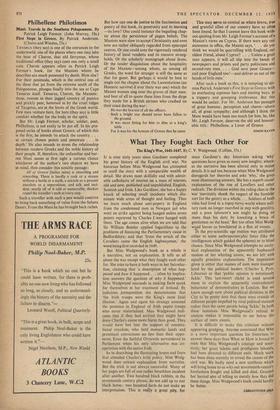Philhellene Philotimos
Mani: Travels in the Southern Peloponnese. By (Chatto and Wind us, 25s.) LENARUS (they say) is one of the entrances to the underworld, one of the places where one may take the boat of Charon, that old ferryman, whose traditional office (they say) costs one only a small coin. Charon appears often in Patrick Leigh Fermor's book, for the Maniots whom he describes are much possessed by death. How else? For their peninsula, which is the central one of the three that jut from the extreme south of the Peloponnese, plunges finally into the sea at Cape Txnarus itself. Txnarus, Charon, the Maniots: these, remote in their jagged country of pumice and prickly pear, hemmed in by the cruel ridges of Taygetus, are at the limits of the Greek world. Few men venture here, for here (they say) is little comfort whether for the body or the spirit.
But Mr. Leigh Fermor, scholar, soldier, poet, Philhellene, is not easily to be put off. In his pro- posed series of books about Greece, of which this is the first, he intends .`to attack the country . . . at certain chosen points and penetrate . . . in depth.' He also intends to stress the relationship between modern Greeks and the noble history of their people. If, therefore, the unfamiliar and bar- ren Mani seems at first sight a curious choice whichever of the author's two objects we have in mind, then consider this notable passage :
All of Greece [italics mine] is absorbing and rewarding. There is hardly a rock or a stream without a battle or a myth, a miracle or a peasant anecdote or a superstition; and talk and inci- dent, nearly all of it odd or memorable, thicken round the traveller's path at every step.
Such a traveller with such a pen would contrive to bring back something of value from the Sahara Desert. From the Mani he has brought back riches.
But how can one do justice to the fascination and poetry of this book, its generosity and its learning —its love? One could instance the beguiling chap- ter about the persistence of pagan beliefs. The Maniots were slow to accept Christianity and even now are rather obliquely regarded from episcopal centres. Or one could note the vigorously rendered history of local vendetta and its massive strong- holds. Or the scholarly monograph about ikons. Or the tender disquisition about the hospitality of the Maniots—among whom, as among all Greeks, the word for stranger is still the same as that for guest. But perhaps it would be best to single out the chapter about the Lamentations (an Homeric survival if ever there was one) which the Maniot women sing over the graves of their men; and best of all to quote these lines from the dirge they made for a British airman who crashed on their coast during the war :
He was the bravest of all the officers.
Such a bright star should never have fallen to the ground.
It was more fitting for him to dine at a king's table . . .
Por it was for the honour of Greece that he came
This may serve to remind us where brave, true and grateful allies of our country have so oftes been found. So that I cannot leave this book witb. out quoting from Mr. Leigh Fermor's account of a Maniot's views on Cyprus. If there were any real statesmen in office, the Maniot says, . . do you think we would be quarrelling with England, our oldest friend, about Cyprus? . . . Unless a great man appears, it will all slip into the hands of newspapers and priests and party politicians and second-rate men. . . . God save poor Greece—. and poor England too!—and deliver us out of the hands of little men.'
After such a book as this, it is tempting to dis- miss Patrick Anderson's First Steps in Greece, with its everlasting espresso bars and touting boys, as a trippery and gossiping irrelevance. But this would be unfair. For Mr. Anderson has passages of great humour, perception and charm—above all, of great sympathy; and although I think the Mani would have heen too much for him, he, like Mr. Leigh Fermor, deserves the old and honour- able title : Philhellene, a Lover of Greece.
SIMON RAVEN






































 Previous page
Previous page